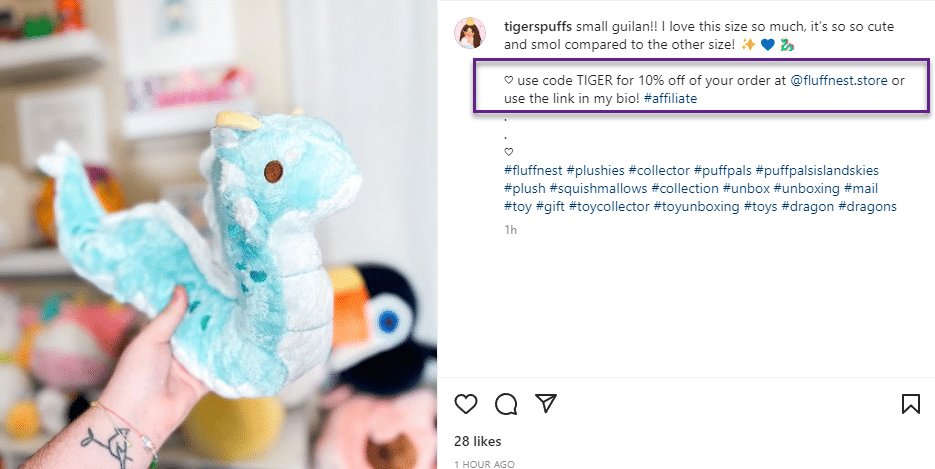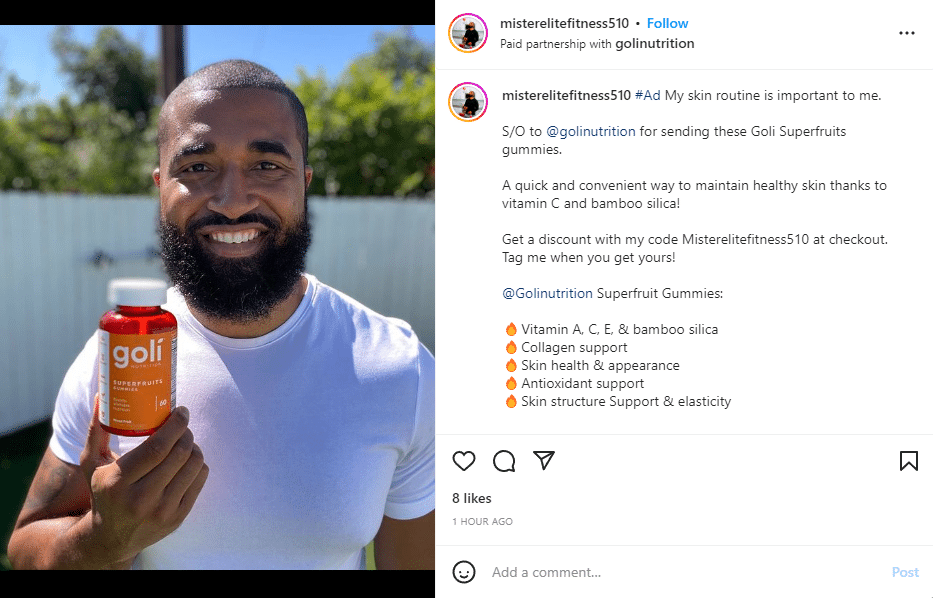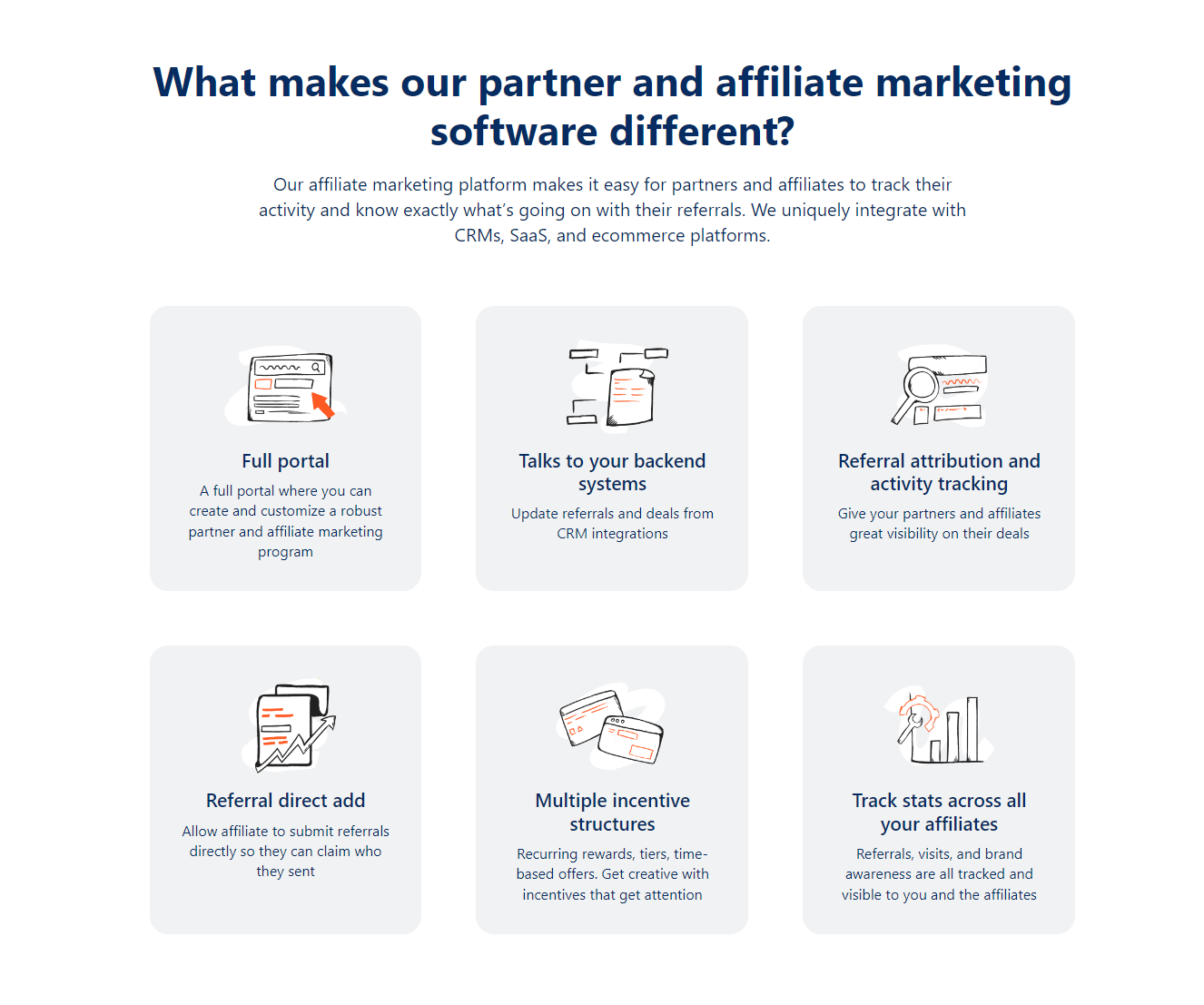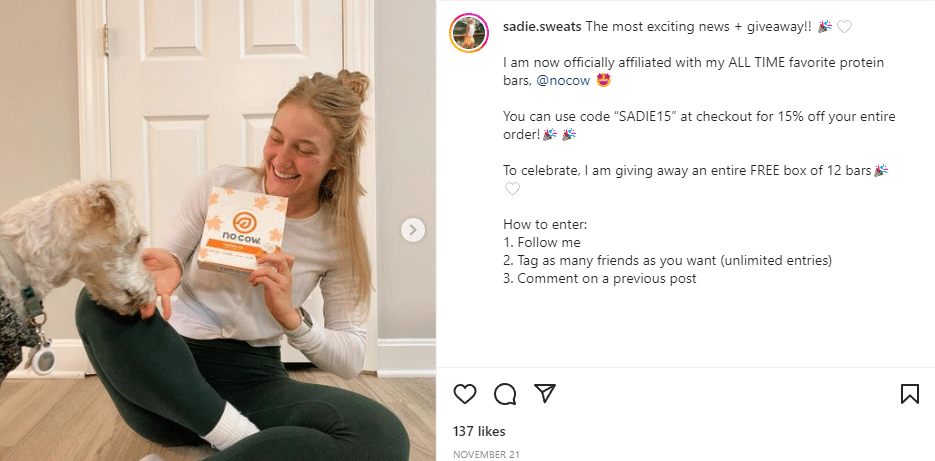What if you could combine the reach of influencers and the reliable tracking of affiliate marketing in your word-of-mouth marketing strategy? That’s what influencer affiliate programs allow you to do. If used correctly, influencer affiliate marketing can be one of the most powerful forms of digital marketing.
This guide covers everything you need to know about influencer affiliate programs, including:
- Why you should combine influencer marketing and affiliate marketing
- How to find influencer affiliates
- Best practices to follow when working with influencer affiliates
What is influencer affiliate marketing?
In an influencer affiliate program, social media influencers act as affiliates and earn commissions on sales. They’ll promote a brand on social media and place affiliate links to that brand in their posts or bios.
If an influencer promotes an affiliate link or discount code, and receives a commission for every sale made through that link or code, they’re engaging in influencer affiliate marketing (regardless of how long the campaign lasts).
This form of marketing is more authentic than traditional advertising. Instead of putting out an ad and hoping people will buy, influencer affiliate programs are more organic because they depend on the trust between the influencer and their target audience.
If people trust a creator enough to watch their videos or read their posts regularly, these people are already predisposed to trust whatever the creator says about a particular product or service–and maybe even buy it! Now, let’s recap the elements of influencer marketing and affiliate marketing in more detail.
Influencer marketing
Influencer marketing involves recruiting people with a significant online following to spread the word about your brand among their followers. They’ll talk about your products, and often show how they use these products in their daily lives. In return, they’ll receive compensation, usually in cash.
Influencer-led campaigns are short-term, typically consisting of a few posts over a couple of weeks. They’re great for building brand awareness in a specific market or promoting a new product line.
Affiliate marketing
An affiliate marketing strategy involves recruiting content creators (like bloggers, social media personalities, website owners, and podcast hosts) to promote your products and place trackable links to your website on their channels.
Whenever someone clicks the affiliate link and makes a purchase, the responsible affiliate earns a cash commission on the sale, paid out either as a flat fee or a percentage of the sale.
It’s like having an army of ambassadors that work for you–except you only pay them when they sell something. Plus, you get the added benefit of knowing exactly how well your marketing campaign performs. This is a great way to get more traffic to your website, and drive sales, without paying for expensive advertising.
Since affiliate links are long-lasting, and affiliates earn money for every sale made through them, this motivates affiliates to keep promoting you in the long term.
(Note that affiliates can be any type of content creator, but influencer affiliates are almost always social media personalities.)
Influencer affiliate marketing: Why combine the two?
Around 4.75 billion people use social media globally, so you need to leverage social media to promote your brand–and influencers are one way to do that.
In addition, influencers are trusted among their followers. They have built up a relevant audience for you, so they know how best to promote your products or services without alienating their existing customers or fans.
People tend to trust the words of others more than they do marketing materials; as such, when influencers promote your brand, they provide social proof that their audience can trust. Their content creation can help increase brand awareness (your brand’s reach)–the right post from the right person could reach thousands or even millions at once!
But while influencers can command a considerable following, measuring influencer marketing ROI can be challenging. It’s difficult to measure the number of buyers you gain, conversion rates, or how much revenue you generate over time thanks to influencers making a post.
Trackable affiliate links change all that by providing you with metrics to measure the impact of your influencer marketing campaign. You can use these links to track how many people click on them, and from there, you can see which post or person led visitors to your website.
This data makes influencer ROI measurable and gives you the information to make data-driven decisions about future influencer marketing campaigns.
Plus, affiliate links make it possible for influencers’ promotions to become long-term, because the associates commissions motivate them to keep promoting those links over time. After the initial campaign where you set most of the parameters, influencers will likely want to make more posts about you on their own.
Additionally, you only pay after an affiliate generates sales–you’ll never have to worry about losing money on a bad investment. You’re not paying affiliates to simply display ads on their social media account; rather, you’re paying them to actively market your product or service and drive conversions.
Are you ready for an influencer affiliate program?
Despite the above benefits, not every brand is ready to use the affiliate marketing model (including with influencers). Here’s how to know if an influencer affiliate program will work for you.
- You’re only ready if you’re okay with paying affiliates cash commissions on every sale they make.
- You’ll also need a high customer retention rate, since high retention means you’ll be more likely to afford the repeated commissions.
- You’ll need to be familiar with social media creators who share your audience.
- And although this isn’t required, it helps if your product appeals to a wider audience
Not ready for an influencer affiliate program yet? Consider social media brand ambassadors. You’ll be able to reward ambassadors with different incentives – not just cash – while still enjoying the rapid reach of social media and the easy ROI tracking.
You might also consider having a few smaller influencers join and promote your referral program.
Choosing the right affiliate tracking tool
The typical influencer marketing platform isn’t thorough enough for this type of program. Since you’re recruiting influencers as affiliates, you need an affiliate-centric tool to create tracking links, track sales, and measure ROI.
Your two options are an affiliate network and affiliate software – and software is the clear winner.
Stay away from affiliate networks
Even though they help find affiliates for you, affiliate marketing networks have far more drawbacks than benefits.
- With a network, you don’t control the relationship with your affiliates – the network is a middleman that owns all of your affiliate data.
- On a network, you’re forced to compete with other brands for the same affiliates.
- Affiliate networks also won’t keep affiliates engaged in selling your products (they benefit when affiliates are involved in many different programs on their network).
- Most importantly, affiliate networks are expensive. They take their own additional cut of your sales – plus sometimes, extra fees – on top of the commission you’re paying affiliates.
- The CJ Affiliate network charges a $3,000 fee for the initial setup, on top of the additional cut of sales you’ll have to pay.
- And the ShareASale network (part of Awin) has a one-time $625 network access fee, plus a $125 minimum deposit fee… on top of 20% of sales paid to the network and a minimum $35 monthly transaction fee.
Use affiliate marketing software
Affiliate software will track affiliate sales, and help you compensate affiliates automatically.
- With affiliate software, you’ll control your data and how you run your affiliate program, and can customize it exactly how you wish.
- Plus, software makes it easier to engage affiliates, especially since your program won’t be positioned alongside competing programs.
- And software costs much less than signing up for an affiliate network. Affiliate software doesn’t take a cut of your commissions like a network does.
Affiliate software is a much better way to manage your affiliates, without all the drawbacks of affiliate networks. Referral Rock offers affiliate software that gives you full control over your program and lets you customize it to your needs.
How to find influencer affiliates?
There are a few ways to find affiliates for your influencer marketing campaign. You can:
- Look at the social media platforms your audience frequents most. For example, if you’re selling running shoes, look for people who are active runners and post about them often.
- Search for industry hashtags, your brand hashtags, and product-related tags on platforms like Twitter, TikTok, and Instagram. This will help you find influencers who are actively engaging with your products.
- Use a brand mention software. This will help find people who have already mentioned your brand, product, or industry. This is a great way to find people interested in what you’re selling on channels beyond social.
- Recruit known existing customers: You may have customers with a strong social media presence. These are the best people to reach out to, as they already have some connection with your brand.
- Build an application form for your website and promote it on social media. Remember to ask the applicants to provide links to their public profiles, so you can check out their posts’ reach, engagement, and style.
Determining the best influencer affiliates
The best affiliate is the one that is a good fit for your brand–and that’s not always just about having a big following. Affiliates should:
Have an audience similar to your own, that would be interested in your products. If you sell in-home fitness equipment, for example, you want an affiliate with an audience interested in staying fit and healthy.
Have a voice, tone, and style that match your brand’s. You don’t have to be identical–but if your affiliate is constantly posting memes or photos of their cats with weird captions, that content may end up feeling “off” next to your branded posts. Look at their other posts and see if they have a similar tone as yours; if they do, then this could be a good match!
Conduct themselves in a way that aligns with your mission and values. It’s not enough to find influencers with similar audiences; they must also align with your mission. An influencer must be aligned with your mission to reach the people who need your product. If you don’t think an influencer is a good fit for your brand, don’t work with them! You can always find someone else.
Be trusted by their followers. This is key: trust is what makes an influencer affiliate’s audience interested in what they have to say.
Have a high engagement from followers. Engagement is key, as it’s a sign of trust! The more engagement an influencer has, the more likely they will reach their audience. If an influencer has a high percentage of their followers commenting on and sharing their posts, then that means they’re doing something right!
Create new content consistently. Ensure that they can provide consistent content over time, not just one video or blog post. This will help build your brand’s credibility in the eyes of consumers and potential customers.
Be ethical. The best content creators are those who are ethical and transparent. This means they do not engage in questionable behavior, such as buying likes or views on social media, using bots to generate comments and shares, or posting fake reviews.
What about audience size?
You don’t need a creator with a huge number of followers to make an affiliate program work. You need to find the right influencers to represent your brand who have a high enough engagement rate and a reasonable following.
Micro-influencers are often the best candidates for affiliate marketing because their followers are more engaged with their content than audiences of more prominent names.
Working with influencer affiliates: Best practices
Working with influencer affiliates is an incredible way to grow your brand and make money. But it’s also a lot of work. You have to manage multiple relationships and make sure that everything goes smoothly. Here are some things you can do to make the process easier:
Create an enticing but sustainable commission structure
Set an affiliate commission rate that’s competitive and that your brand can pay consistently without endangering your business’ bottom line. There are two payment options: a flat fee or a commission on the sale. Affiliates should be paid in cash, not services or other non-cash items (although gifting these items works well as a bonus,in addition to the cash).
If you need help determining how much to pay your affiliates, start by looking at what other companies in your industry are spending. You can also ask for input from the influencer, as they may have ideas on what they would be comfortable receiving.
The important thing is to have pricing that’s enticing but sustainable. You don’t want to lose money on each sale, but you also want to leave only a little room for negotiation.
Only pay out commissions when a sale happens through an affiliate’s link. This is good business sense and helps you stay focused on making sales. Plus, it protects your brand – if you’d pay for traffic, that would make it easier for unethical affiliates to game the system.
Remember to account for the tracking cookies: How long will an affiliate continue to be eligible for earning commission payments after someone clicks on their link? This can vary depending on the product, but it’s generally anywhere from 5 to 30 days.
It would help if you also considered how long it will take for an affiliate to receive their commission payment. Some programs will pay out on the spot, whereas others may take longer.
Figure out terms for the promotion of your products
When you work with influencer affiliates, setting clear expectations is essential. Think about the following:
- Will you require them to create a certain number of posts for your brand in certain timeframes?
- What are the rules for how they can and can’t promote their links?
- Are there specific products you want influencer affiliates to promote, or can they promote any?
- Will they promote only top-selling products?
- Or, will you assign specific products to influencer affiliates, depending on what their followers would enjoy and benefit from?
- What rules do you have regarding what affiliates can and can’t say in their posts about you?
- Are there any guidelines for the text, images or videos they create featuring your brand (such as image quality, hashtag use, and language rules)?
By setting these expectations up front, you can avoid confusion and frustration on both sides. Your influencer affiliates will be able to promote your products in a relevant and authentic way to their followers, and you’ll get the results you want from the marketing campaign.
Train influencers on how to best promote you
Once you’ve established what types of products your influencer affiliates can promote, it’s time to train them on how best to do so. You want them to be able to answer any questions about the product and its benefits, as well as highlight any ways that it could improve people’s lives.
Your influencers shouldn’t just be good at promoting your brand; they should also be knowledgeable about it.
First, train them on how best to promote your product or service.
Send an email or direct message informing your followers of the program and its benefits. Also, direct your affiliates to sign a written affiliate program agreement, where they consent to all terms of the program and show they understand what you expect from them as an affiliate partner.
Then go over fundamentals, like how your brand operates and what products best represent it. In addition, give them an overview of best practices for promoting affiliate links on their accounts.
Lastly, discuss any unique selling points for your brand or products; make sure affiliates understand what not to say to avoid misconceptions about your company.
Collaborate on content ideas
Collaborating with influencer affiliates on engaging content ideas is a great way to get your products in front of a new audience. Here are some ideas for affiliate influencer content that your partners could create for you:
- Contests: Give away free products or services to the audience, or ask the audience to submit their own photos of themselves using it. The more creative influencers can get with this, the better!
- Unboxings: Show off the product and all its bells and whistles by unboxing it in front of the camera.
- Educational videos: Create TikTok, Instagram, or Youtube videos that teach people how to use your product/service in an exciting way.
- Tutorials: Make tutorials showing people how they can use your product or service differently; these might include recipes or styling tips.
- How they use the product during a typical day: Create content showing how they use your product daily. These could be videos or images showing how they use it in real-time throughout their day (and even into the night).
- Top 5: Create a video or article that lists the top five features of your product, including any unique selling points.
Keep influencer affiliates engaged
Now that you’ve found the perfect influencer affiliates to work with, it’s time to set them up for success.
When working with influencer affiliates, remember that your goal is to turn them into long-term promoters. The more they love your product and successfully sell it to their audience, the more likely they will stick with you and continue promoting it.
So how do you keep them engaged? Change up affiliate commissions or offer temporary commission bonuses (or both) at strategic times–either during high or slower sales periods. This way, even if sales aren’t going well one month, the affiliate will still feel like they’re making progress towards their goals and can stay motivated.
You could also offer permanent bonuses (or tangible incentives) when affiliates meet specific sales goals–and add an incentive for being one of the top performers in each quarter or year.
Or, create a sales leaderboard so affiliates can track their actions against other affiliates and themselves. This is a great way to motivate your affiliates and get them excited about sales.
Remember to update your affiliates on the program–and any changes–regularly so they know what’s happening at all times and understand what you expect from them. Sending newsletters (or creating an exclusive social media or Slack group) is a great way to do this.
You can also use affiliate software to automate engagement and communication with your affiliates.
The software will help you build an automated email campaign that regularly sends newsletters, updates, and other information to all affiliates in the program.
Make influencer affiliates’ promotions easier
Part of an affiliate program’s success is making it easy for your affiliates to promote your products and make money from them.
You can give them coupon codes tied to your affiliate links, making it easy for their audience to get the products they want at a lower price, and for them to earn more commissions as a result.
You can also alert affiliates when certain products are performing exceptionally well, so they can quickly jump on the bandwagon and promote those products. Or, create guides with ideas for posts (including for affiliate-created images, and language ideas, to include in posts).
In addition to coupon codes and alerts, you can also give affiliates access to your products for free, for the most authentic social promotion.
The more options you give them, the more likely they will find something that works well for their audience and promote it.
Wrapping up
Affiliate marketing programs are a great way to put your brand in front of new audiences, and generate leads and sales. The key is to work with the right people–those who will genuinely invest in promoting your products and engaging with their followers.
By combining affiliate and influencer marketing, you can maximize your brand’s potential through long-term partnerships. In addition, you’ll find new audiences and create a loyal following that will continue to buy from you long after they first heard about it through an influencer’s post.
Once you’ve found those influencers, work with them closely. Keep an eye on how their campaigns perform and provide support where necessary. If you do this right, your influencer affiliate marketing campaigns will be much more successful.
Ready to set up and track affiliate influencer campaigns? Check out the ultimate list of affiliate software.







